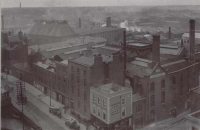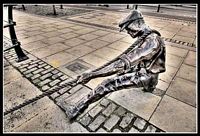Jim Larkin
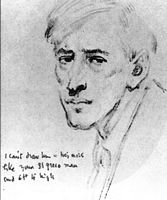
Jim Larkin — Irish socialist, trades unionist; known to his followers as "Big Jim" – the nickname earned as much by his large and outgoing personality as by his tallness of stature. He was born in Liverpool in 1876 of Irish parents, raised by his grandparents in Ireland until the age of 9, when he returned to England to start working. By the age of 18 he had risen to be a foreman at Liverpool docks – a position he sacrificed when he went on strike with the boys under him, rather than betray their interests.
Larkin was "the nearest thing to a revolutionary leader that the modern trade union movement has thrown up" – Oxford Dictionary of British History.
Irish labour had been slow to organize. What unions existed tended to cater for skilled craftsmen – boilermakers, plumbers, bricklayers – which were formed as sedate offshoots of British mainland societies. The nationalist movement had concentrated on political change and land reform: the conditions of the urban working class were ignored. In Dublin particularly these conditions were deplorable. Dublin Poor
Dublin, unlike Belfast to the north and the regional centres in Britain, lacked an industrial base. The only significant industries were Guinness's brewery and Jacob's biscuit factory. Unskilled labour accounted for "around half of the workforce" (by comparison, the proportion in Britain in 1911 was 10 per cent).
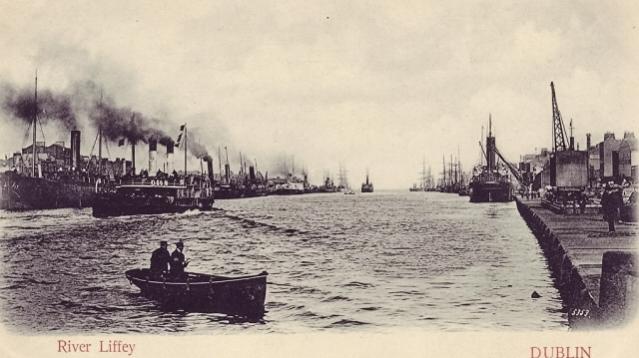
A preponderance of this work centred round the Dublin docks. Dock work was low-paid, bit-rate, dangerous and casual. And there was never enough of it: a labour surplus kept wages down, so that a Dublin labourer was paid 18 shillings for a 70 hour week, two-thirds the average in Britain. At the time, 22 shillings per week was considered the barest minimum to maintain "merely physical efficiency".
High rates of unemployment and under-employment rendered workers "extremely vulnerable to victimization by employers". The playwright Sean O'Casey, a labourer at age 14, records being fined 2 shillings of his 7 shillings and sixpence wages for "impudence and disobedience"; at a later job he was sacked on the spot for not removing his cap while being paid.
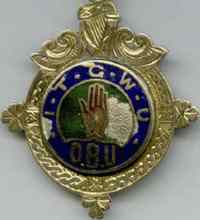
Larkin's response was to form in 1908 the Irish Transport and General Workers' Union – "the Church militant here on earth of the Irish workers" as Sean O'Casey, an early member, described it.
In theory this was to be the "one big union", advancing the cause of all workers alike, from labourers to craftsmen. But in practice it organized Dublin's unskilled.
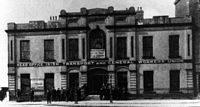
Larkinism was Larkin's own personal blend of socialism, syndicalism, republicanism and modern militant trades unionism. His tactics were the sympathetic strike (calling out uninvolved workers to encourage employers as a class to settle disputes) and "blacking" goods (boycotting and refusing to handle the products of unsympathetic firms, just as these firms themselves "blacklisted" workers whom they regarded as "agitators").
These were inflammatory notions at the time: they speedily lost him any support from the British Trade Union Congress. In Ireland, they were revolutionary. What next? – parlour maids unionised? the barefoot newsboys in the street? (In fact the Dublin newsboys did enrol in the Union and Larkin reached out to Dublin's teeming female servantry.) His every victory seemed a step towards social collapse. He was becoming too powerful, too successful and far too popular.
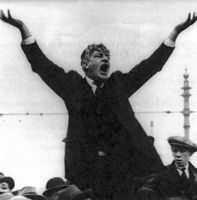
Larkin's energy and magnetism, his gifted oratory, endeared him to the Dublin poor who flocked in their thousands to join. His headquarters at Liberty Hall was a venue for song and dance as much as speeches and exhortation, giving "a welcome and twenty to all who came to fight for a life something higher than the toiling oxen and the bleating sheep":
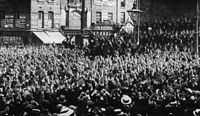
In the streets the children sang:
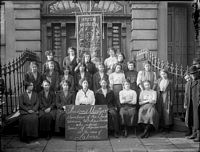
He organised a temperance campaign, and he ended the practice of casual labourers being paid their wages in public houses (the publican was usually a crony of the foreman, and a worker who hadn't spent sufficient on alcohol would find himself unemployed the following week). He founded, with his sister Delia Larkin, the Irish Women Workers' Union, the "first, and only long-lived Irish all-women's trade union".
To the Dublin working class he was a hero.
The alarm of the Dublin employers led them in turn to organize. In August 1913 they announced that no one – man, woman or child – might work in Dublin unless first he pledged to repudiate Larkin's union. Thus began the great Dublin Lock-out. Six months later, their families starving, the Dublin workers surrendered.
Larkinism, like so many Irish endeavours, ended in failure, and like so many Irish failures it proved the basis of future betterment. Larkin had mobilised the Dublin workers for the first time and employers afterwards dared not treat their employees with quite the same "casual brutality and indifference" as in the past.
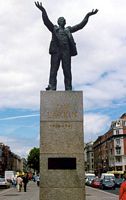
In October 1914 Larkin, "worn out and frustrated", left Ireland for the United States. Whilst there he joined the Socialist Party of America, and was involved in organizing the Industrial Workers of the World or "Wobblies" as they're better known. He was arrested in 1919 during the "Red Scare", and sentenced to 10 years' imprisonment at Sing Sing, New York. In 1923 he was granted a free pardon.
He returned to Dublin to a triumphant welcome, but he never regained his position as head of an Irish labour movement. He was a TD (member of the Irish parliament) on and off till his death in 1947. At his funeral Sean O'Casey told how Larkin had brought to the labour movement "not only the loaf of bread but the flask of wine". His statue in O'Connell Street, Dublin, proclaims in English, French and Irish the slogan of the French Revolution: "The great appear great because we are on our knees: Let us rise."
